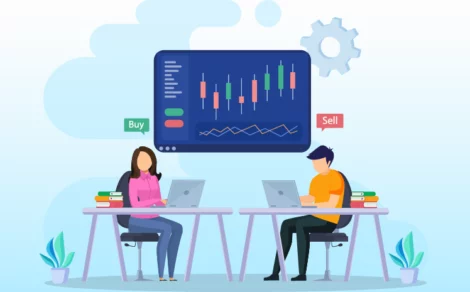Yes, an example of an exchange-traded instrument in India is the NIFTY 50 futures contract traded on the National Stock Exchange (NSE). Other examples include stock futures and options of companies like Reliance [NSE:RELIANCE] or Infosys [NSE:INFY], which are also traded on the NSE.
Toruscope » Derivative Market » Everything You Need to Know About Exchange-Traded Derivatives
Understanding the Meaning of Exchange Traded Derivatives
So, what is exchange-traded derivative? In simple words, they’re contracts you can buy or sell on public exchanges that are based on the price of an underlying asset like a stock, commodity, or market index. For example, instead of buying gold bars, you could trade a gold futures contract that’s tied to the price of gold. These contracts are standardized, regulated, and traded through official platforms like the NSE (National Stock Exchange) or the CME (Chicago Mercantile Exchange). And unlike private contracts (known as over-the-counter or OTC deals), exchange-traded derivatives offer more transparency, less risk, and easier access for everyday investors.Different Types of Exchange Traded Derivatives
Not all exchange-traded derivatives are the same. They come in a few different “flavors,” depending on the need:- Futures Contracts: You agree today to buy or sell something later at a set price. This is common in commodities, like oil or wheat. Businesses use these to lock in prices ahead of time and reduce risk. For example, an airline company might use oil futures to manage rising fuel costs.
- Options Contracts: These give you the right, but not the obligation, to buy or sell an asset at a fixed price. You can:
- Buy a Call Option to bet prices will go up.
- Buy a Put Option if you think prices will drop.
- Index Derivatives: Want to bet on the whole market instead of one stock? Index derivatives let you trade on indices like the Nifty 50 or Sensex.
- Commodity Derivatives: These are based on physical goods like gold, silver, crude oil, and agricultural products. Both producers and consumers use them to lock in prices and protect against price swings.
Key Features Of Exchange Traded Derivatives
What makes exchange-traded derivatives special? Here’s what sets them apart:- Standardization: Every contract follows the same structure, same lot size, expiry date, etc.
- Transparency: Prices are published in real-time, making everything open and visible.
- Lower Risk: A clearinghouse sits in the middle of every trade, reducing default risks.
- Liquidity: High trading volume means you can buy or sell easily.
- Regulation: All trades are monitored by governing bodies, reducing fraud and manipulation.
Understanding Exchange Traded Derivatives with an Example
Let’s bring it down to earth with some real-world scenarios: Airline Fuel Costs: Airlines use crude oil futures to manage fuel prices. Say an airline thinks oil prices will rise in the next three months, it can buy a futures contract now to lock in current prices. If oil goes up, they save money. Investing in Market Trends: Suppose you believe the Nifty 50 will rise next quarter. Instead of buying 50 different stocks, you could buy a futures contract based on the index. If the index rises, you profit without needing a huge upfront investment.Final Thoughts
At first glance, exchange traded derivatives might seem like tools only Wall Street experts would touch. But they’re not. They’re used by farmers, airlines, retail investors, regular people, and businesses trying to protect themselves or take advantage of market opportunities. The beauty of these contracts lies in their flexibility. You don’t need to own the asset. You don’t need to predict the future perfectly. You just need to understand how to use these tools to manage risk or capture opportunities.Frequently Asked Questions
In India, the National Stock Exchange (NSE) and the Bombay Stock Exchange (BSE) both operate active derivatives segments. Among them, NSE is the leading derivatives exchange, offering futures and options on indices like NIFTY and stocks of major companies.
OTC (Over-the-Counter): Custom, private contracts with flexible terms, but more risk.
ETD (Exchange Traded Derivatives): Standardized, publicly traded contracts with more transparency and lower counterparty risk.
Stocks, ETFs, REITs, bonds, and derivatives like futures and options can all be traded on exchanges.
Related Reads
Understanding Synthetic Long and Short Strategies in Options
In the world of options trading, strategies often get complex, especially when you're trying...
By: torus
- 5 mins
- 30.May.2025
- 0(0)
- 137
Understanding Weekly Options: A Complete Guide
In the fast-paced world of trading, flexibility and speed often become key factors for...
By: torus
- 7 mins
- 28.May.2025
- 0(0)
- 165
How OTM Call Options Work in the Stock Market?
Options trading can feel like a game of chess with financial terms; some of...
By: torus
- 5 mins
- 28.May.2025
- 0(0)
- 138
What is Margin Money in Trading?
Money talk can get complicated fast. Terms like “collateral,” “leverage,” and “margin” get thrown...
By: torus
- 9 mins
- 28.May.2025
- 0(0)
- 143
What is Rollover? How Does it Impact Your Trades?
Ever noticed how traders talk about the end of the month like it’s a...
By: torus
- 8 mins
- 28.May.2025
- 0(0)
- 169
Weekly vs. Monthly Options: A Complete Guide for Traders
Options trading allows investors to hedge risk, generate income, or speculate on market movements...
By: torus
- 4 mins
- 27.May.2025
- 0(0)
- 331
Disclaimer: The content provided in this blog is for informational purposes only and does not constitute financial advice or recommendations. The content may be subject to change and revision. Readers are encouraged to conduct their own research and consult with a qualified financial advisor before making any investment decisions. Torus Digital and its affiliates takes no guarantees whatsoever as to its completeness, correctness or accuracy since these details may be acquired from third party and we will not be responsible for any direct or indirect losses or liabilities incurred from actions taken based on the information provided herein. For more details, please visit www.torusdigital.com.
Tenneco Clean Air IPO Listing: Strong Market Debut with 27% Premium
Tenneco Clean Air India Ltd made a confident entrance into the public markets on...
By: torus
- 5 mins
- 19.Nov.2025
-
3.7(6)
-
139
Stock to Buy Today: November 19, 2025
The Indian stock market witnessed a mild decline on November 18, 2025, ending a...
By: torus
- 4 mins
- 19.Nov.2025
-
4.3(3)
-
139
Mirae Asset Infrastructure Fund NFO: A Sector-Focused Bet on India’s Growth
Mirae Asset Mutual Fund has launched a new equity scheme — Mirae Asset Infrastructure...
By: torus
- 4 mins
- 18.Nov.2025
-
4.3(6)
-
139
Emmvee Photovoltaic IPO: Shares Make Muted Market Debut, List Flat At ₹217
Emmvee Photovoltaic Power made a muted debut on 18 November 2025, listing flat at...
By: torus
- 3 mins
- 18.Nov.2025
-
3.7(6)
-
139








